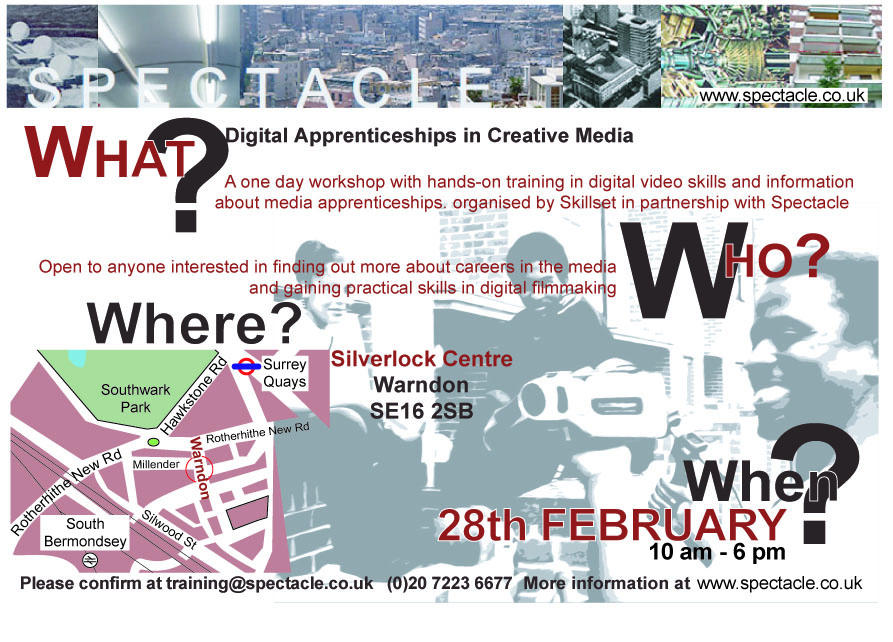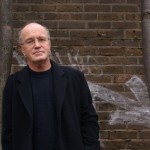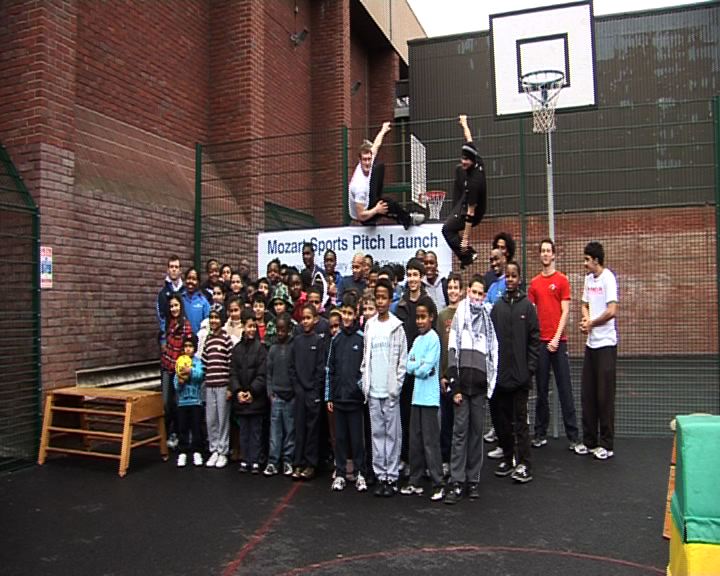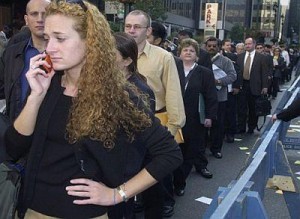The Well London event at Queens Park in Westminster, to encourage people to use the Jubilee Pitch, was a huge success. To help bring new user groups to the Jubilee Pitch the event had activities such as Parkour techniques and team sports for the young, as well as Groundwork who surveyed residents views about the area, in particular suggested locations for a community garden, and SLaM Happiness Stalls where entrants could hang their ideas about what made them happy on the Happiness Tree and various community initiatives that promote well being.
Author Archives: admin
As journalists join the dole line will reporting of poverty improve?
As the number of media professionals facing unexpected redundancy rises will the gap of experience between those who report on poverty and those who experience poverty decrease?
For more clips from our Poverty and The Media project please visit our Archive
To find out more information about our Poverty and The Media project please visit our Project Page
London Social Forum – Sripriya Sudhakar
Sripriya Sudhakar (an architect from India) talks about urban design taking place in London in comparison to India. Sripriya expresses her views on; utopia, sustainability, social exclusion, poverty in London compared to India and lastly planning for a better London.
To watch the interview click below:
London Social Forum – Sripriya Sudhakar Interview
Free Spectacle Digital Media Training day 28th Feb
 This is a free introductory training day in digital production sponsored by Skillset. As well as learning the basics of using and operating a camera in a workshop environment participants will get the opportunity to learn about Digital Apprenticeships in Creative Media from a Skillset advisor. This is an excellent opportunity for anyone looking to expand their horizons and learn more about video production as well as those interested in getting some careers advice on working in the media.
This is a free introductory training day in digital production sponsored by Skillset. As well as learning the basics of using and operating a camera in a workshop environment participants will get the opportunity to learn about Digital Apprenticeships in Creative Media from a Skillset advisor. This is an excellent opportunity for anyone looking to expand their horizons and learn more about video production as well as those interested in getting some careers advice on working in the media.
Places are limited, to avoid disappointment please email training@spectacle.co.uk or call 02072236677 as soon as possible to book your place. To keep regularly updated with all our activities please join our Facebook group.
Iain Sinclair banned from Hackney libraries because of Olympic criticism
 Iain Sinclair, novelist and long standing Hackney resident has been banned from reading extracts of his new book in Hackney libraries because of his criticisms of the 2012 olympics. In an interview that was published in the Guardian, Sinclair describes the measures taken by Hackney council to stifle debate on the Olympic issue.
Iain Sinclair, novelist and long standing Hackney resident has been banned from reading extracts of his new book in Hackney libraries because of his criticisms of the 2012 olympics. In an interview that was published in the Guardian, Sinclair describes the measures taken by Hackney council to stifle debate on the Olympic issue.
“I was asked to go along to Stoke Newington library to speak to 20 people: old hippies and local history buffs, probably. But I’d written an anti-Olympics piece in the London Review of Books, and so the Hackney thought police decided: no, we can’t have this person in our library. They lied about this all the way down the line, insisting it was nothing to do with the Olympics but that they can’t have ‘controversial’ topics discussed in libraries. Eventually someone from the Hackney Citizen used the Freedom of Information Act to get the transcript [of what was said in a meeting] and, sure enough, it came directly from the Mayor, Jules Pipe, saying that this person is anti-Olympics, and he doesn’t go into our libraries. So Hackney Council is my co-sponsor, really – and, of course, this manipulation [on the part of the council] is also a big theme of the book.”
For more information on Spectacles Olympic Project please visit our Project Page
For Spectacles latest film on the Olympics please visit our archive page.
![]()
Depictions of Poverty: what happens when the film makers leave?
Rich Kid, Poor Kid, The Secret Millionaire, The Tower and Repossession, Repossession, Repossession are all programs that centre around ‘poor’ areas and attempt to explore social inequality through individual stories.
What happens to the individuals or areas in these programs when the film makers leave?
What are the consequences of putting peoples personal circumstances on television?
For more clips from our Poverty and The Media project please visit our Archive
To find out more information about our Poverty and The Media project please visit our Project Page
Glenn Jenkins response to Secret Millionaire
Below is a short extract from one of Spectacle’s Poverty and the Media workshops on the Marsh Farm Estate. In this clip Glenn Jenkins, long-term community activist and part of Marsh Farm Out Reach, talks about the way television programs, such as Secret Millionaire, Big Brother and Jeremy Kyle, treat poorer people.
Runnymede study blasts media depiction of white working class
According to a newly published study by the Runnymede Trust, Who Cares about the White Working Class?, poverty is the biggest cause of discrimination against white working class people not race.
The report states “The white working classes are discriminated against on a range of different fronts, including their accent, their style, the food they eat, the clothes they wear, the social spaces they frequent, the post-code of their homes, possibly even their names. But they are not discriminated against because they are white,”.
The Guardian writes the report attacks middle class media commentators for simultaneously defending white working class interests against the false attack of politically correct multiculturalism whilst they simultaneously deride and ridicule the feckless and undeserving poor, who have squandered the opportunities offered by the welfare state.
The BBC’s The White Season and Channel 4’s Immigration-The Inconvenient Truth, come in for particular criticism. Of these programs the report says “The interests of the white working class are habitually pitched against those of minority ethnic groups and immigrants, while larger social and economic structures are left out of the debate altogether.”
Are the media really concerned with the white working class or are they just jumping on the scapegoating bandwagon?
Why do the media focus on race instead of class?
Repossession, Repossession, Repossession
ITV’s new program Repossession, Repossession, Repossession focuses appropriately on people whose lives have been turned upside down by debt in the most dramatic fashion by the loss of their homes.
Following the lives of a family, a glamour model, a gambler and most interestingly Jamie an ambulance driver, it attempts to explain how these people got into a mountains of debt. Although the program lays some blame on banks and financial instituitions, it still focuses on individuals ‘spending sprees’ as the real reason their homes repossesed.
As Gary Hoffman, group vice-chairman of Barclays, rather checkily explains: “People binge eat, they binge drink, sometimes they spend, sometimes they binge borrow and what I encourage, what Barclays encourage, is for customers to talk to us when they have a problem.”
This from a man whose bank has lent millions pounds to those on low-comes and made a large fortune out credit card repayments.
The biggest question in this program should not be why are people are spending so much more than they earn? Or have people become too greedy? But why are public sectors workers like Jamie, who carry out essential services such as driving ambulances, earning so little they rely on debt to get by?
When will there be a program asking vice-chairs of Banks why they ran up so much debt they require billions of pounds of government bail outs?
Rich Kid, Poor Kid showing a divided London
Channel 4’s Cutting Edge documentary Rich kid, Poor Kid tells the story of two London teenages who live in the same street but inhabit different worlds. As the title suggests they are separated by great social and financial inequality one attending private school and one living in a council flat. A great deal of the narrative is structured around the girls living so geographically close together but does it really give an accurate picture of the local area or those who live in it?
Do you live in the Rich Kid, Poor kid area? Is it a realistic depiction of the way people interact?
Has the area you live in been in a documentary?
How was your area portrayed?



